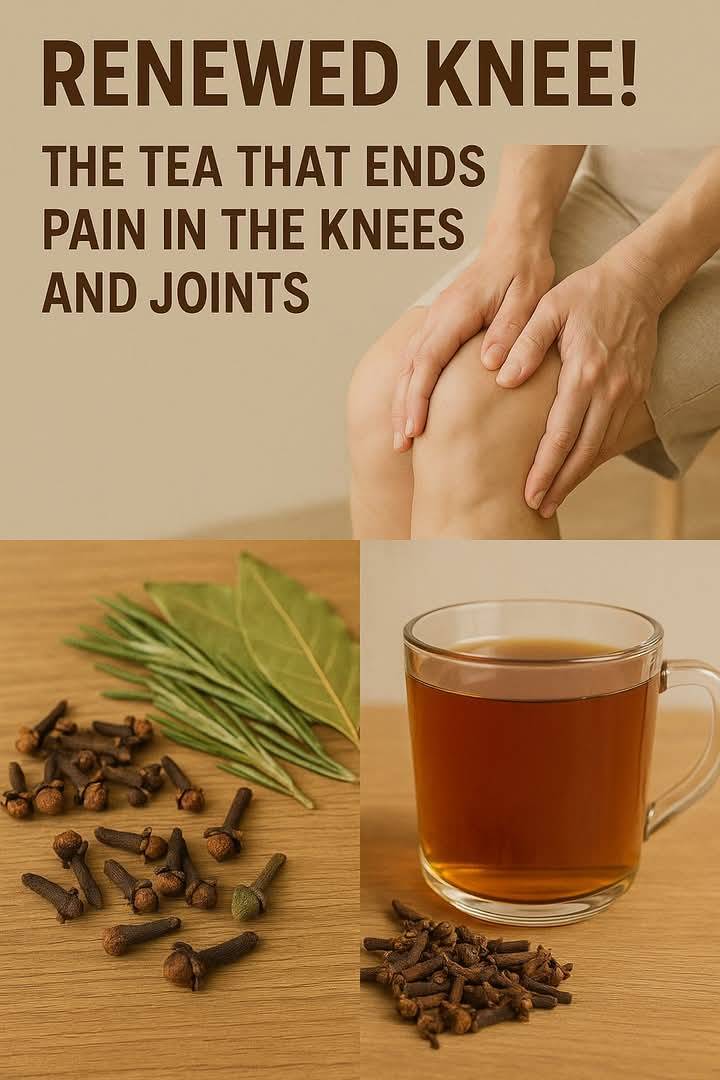Is Renewed Knee Relief Just a Cup Away? Exploring the Power of Tea for Joint Pain
Knee pain. It’s a nagging ache that can steal your joy, limit your movement, and make everyday tasks feel like a monumental effort. If you’re one of the millions searching for a natural way to ease that discomfort, you’ve likely stumbled upon the claim that a simple cup of tea can bring renewed knee relief. But is there any truth to it? Can tea really end pain in the knees and joints? Let’s dive into the facts and explore what the science says about tea and joint health.
 A close-up of a steaming cup of herbal tea with natural ingredients like ginger, turmeric, and lemon visible.
A close-up of a steaming cup of herbal tea with natural ingredients like ginger, turmeric, and lemon visible.
Understanding the Connection: Tea and Joint Health
Tea, especially certain herbal varieties, boasts a wealth of compounds with anti-inflammatory and antioxidant properties. These compounds can potentially play a role in managing joint pain associated with conditions like osteoarthritis and rheumatoid arthritis. However, it’s important to remember that tea is not a cure-all. It’s best viewed as a complementary approach that may help ease symptoms alongside other treatments like exercise, physical therapy, and medication prescribed by your doctor.
 An infographic illustrating the anatomy of a knee joint and highlighting areas affected by arthritis.
An infographic illustrating the anatomy of a knee joint and highlighting areas affected by arthritis.
The Key Players: Beneficial Compounds in Tea
Several components found in various teas have shown promise in reducing inflammation and protecting joint cartilage:
- Polyphenols: These powerful antioxidants, abundant in green tea and black tea, can help neutralize harmful free radicals that contribute to inflammation.
- Gingerol: Found in ginger tea, gingerol possesses potent anti-inflammatory properties that can help reduce pain and stiffness.
- Turmeric (Curcumin): While technically a spice, turmeric tea is gaining popularity for its curcumin content. Curcumin is a powerful anti-inflammatory agent that may help alleviate joint pain.
- Rosehip: Rosehip tea contains compounds that may help reduce cartilage degradation and inflammation in joints.
 A collage showcasing different types of teas (green, black, ginger, turmeric, rosehip) with their key health benefits highlighted.
A collage showcasing different types of teas (green, black, ginger, turmeric, rosehip) with their key health benefits highlighted.
Which Tea is Right for You? A Guide to Choosing Wisely
Not all teas are created equal when it comes to joint health. Here’s a breakdown of popular choices and their potential benefits:
- Green Tea: Rich in polyphenols, green tea offers antioxidant and anti-inflammatory benefits. Look for high-quality, loose-leaf varieties for optimal results.
- Ginger Tea: A potent anti-inflammatory, ginger tea can help reduce pain and stiffness. You can make your own by steeping fresh ginger slices in hot water.
- Turmeric Tea: Curcumin in turmeric may alleviate joint pain. It’s often combined with black pepper to enhance absorption.
- Rosehip Tea: This tea may help protect cartilage and reduce inflammation. It has a slightly tart and fruity flavor.
 A comparison chart of different teas, highlighting their key ingredients and potential benefits for joint health.
A comparison chart of different teas, highlighting their key ingredients and potential benefits for joint health.
Beyond the Cup: Maximizing the Benefits of Tea
Drinking tea is just one piece of the puzzle. To truly support your joint health, consider these additional tips:
- Maintain a Healthy Weight: Excess weight puts extra stress on your joints, especially your knees.
- Exercise Regularly: Low-impact exercises like swimming, cycling, and walking can help strengthen muscles around your joints and improve flexibility.
- Eat an Anti-Inflammatory Diet: Focus on fruits, vegetables, whole grains, and healthy fats. Limit processed foods, sugary drinks, and red meat.
- Consult a Healthcare Professional: If you’re experiencing persistent joint pain, see a doctor to get a proper diagnosis and treatment plan.
 A visual representation of a healthy lifestyle, including a balanced diet, regular exercise, and sufficient rest.
A visual representation of a healthy lifestyle, including a balanced diet, regular exercise, and sufficient rest.
Renewed Knee Relief: A Part of a Holistic Approach
While a cup of tea might not be a magic bullet for knee pain, incorporating it into a holistic approach to joint health can certainly be beneficial. The anti-inflammatory and antioxidant properties of certain teas can help ease symptoms and support overall well-being. Remember to choose high-quality teas, stay consistent with your intake, and combine it with other healthy habits for optimal results. Always consult with your doctor before making significant changes to your diet or treatment plan, especially if you have underlying health conditions.
 A person enjoying a cup of tea while stretching gently, symbolizing a balanced approach to managing joint pain.
A person enjoying a cup of tea while stretching gently, symbolizing a balanced approach to managing joint pain.
